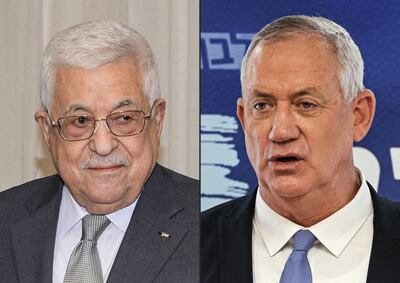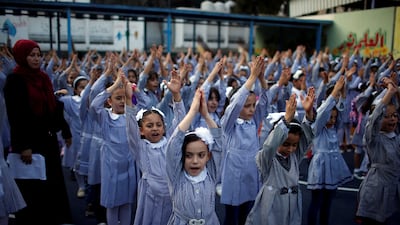For most of the world, caught in the grip of a pandemic, 2021 has been a year of inching painfully in the direction of progress. For Palestine, it has been a year of a few steps forward, many steps back.
Sunday saw a forward step, when Palestinian Authority President Mahmoud Abbas hosted Israel’s Health Minister, Nitzan Horowitz, in the West Bank. Mr Horowitz is now the second high-level Israeli official to meet Mr Abbas since the formation of Israel's new government, after Defence Minister Benny Gantz did so in August. After Sunday's meeting, Mr Horowitz posted on his Twitter account: "We have a shared mission: to preserve the hope for peace on the basis of a two-state solution.”
A two-state solution would represent much more than a step; it would be a titanic leap forward. After more than seven decades of tragedy, it remains the most just and feasible end to the conflict. Unfortunately, Mr Horowitz’s tweet is no indicator of a sea change. Palestinian and Israeli peace advocates, along with the majority of the international community, have long pushed hard for it, only to be pushed back by the conservative wing of Israeli politics.

As Palestine’s dreams of sovereignty are dashed, its humanitarian situation only grows worse. On Friday, the UN agency in charge of helping Palestinian refugees, UNRWA, was forced to appeal for an urgent $120 million, as a result of what it called a "real existential threat to the organisation". The agency oversees education for 550,000 children, health care for thousands and other essential social services where there are populations of Palestinian refugees.
The US administration under Joe Biden has renewed its support of UNRWA to the tune of $235 million after its predecessor withdrew funding, but the agency's finances have been hit by a wider reduction in donations from other countries as the world struggles with the economic consequences of the pandemic.
Keeping Palestinian society moving is more important than ever, particularly after 2020, which the UN called the worst year for Palestinians in 30 years. Palestine's economy shrank by 11.5 per cent, and more than 66,000 of its people lost their jobs. The main cause of this is the pandemic, which will carry on being a burden for Palestine as it struggles to implement the many strategies needed to control the virus.
It is quite something if 2020 was the worst year during three decades of war, economic crisis and ongoing encroachment of Palestinian sovereignty. It highlights the need for more meetings such as August's between Mr Abbas and Mr Gantz, which are more than surface-level attempts to signal the end of the hawkish Netanyahu era. Today, new frameworks are in place to push real change; Yousef Al Otaiba, the UAE ambassador to the US, recently told The National that the Abraham Accords would continue to thrive under President Joe Biden.
If meetings do genuinely intend to make the situation better, then both parties must make a renewed and genuine push towards peace.


